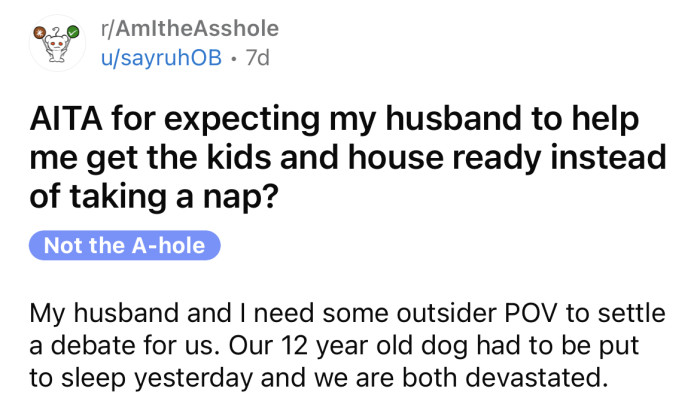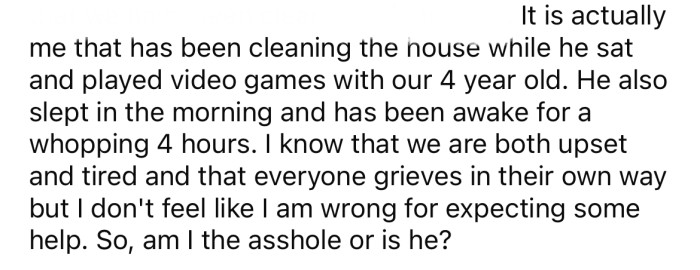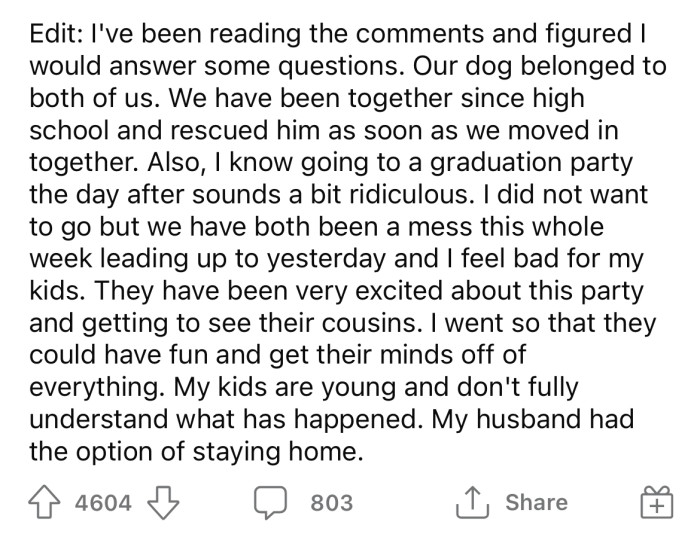Woman Asks If She's An A**hole For Expecting Her Husband To Help Out Instead Of Taking A Nap Because He Is Grieving Dog's Death
Losing a pet is one of the most painful experiences we can endure. They are part of our family, and we love them dearly.
So, when Reddit user u/sayruhOB and her family recently lost their beloved dog, they were understandably devastated. She shared the story in the AITA (Am I The A**hole?) subreddit.
The OP explained that she and her family had to make the difficult decision to put their 12-year-old dog to sleep. Both the OP and her husband were overwhelmed with grief.
However, the day after their dog passed away, the OP's cousin was graduating from high school and having a party to celebrate. The couple's children were looking forward to the party, so the OP decided to take them in hopes of helping them take their minds off everything.
While the OP was frantically trying to get the kids ready for the party and tidy up the house, her husband decided it was a good time to take a nap and leave the OP to handle everything. When she asked him if he could please wait until after the party to take a nap, he became upset and said he needed to "sleep so that he can grieve."
The OP had been cleaning all morning while her husband played video games with their four-year-old. Therefore, she didn't think it was unreasonable to expect a little help.
But now the OP is wondering if she was the a**hole here. Keep scrolling to see how people reacted.
The OP asked if she's an a**hole for expecting her husband to help around the house instead of taking a nap after their dog passed away.

The OP's husband decided to take a nap instead of helping his wife with their kids and cleaning the house.

OP's husband said he needed to "sleep so that he can grieve."

The Grieving Process and Its Impact on Relationships
Grieving is a complex, multifaceted process that affects individuals differently. Dr. Karen Hall, a grief counselor at the University of Michigan, explains that grief can often feel isolating, compelling individuals to withdraw while they navigate their emotions.
However, when other responsibilities demand attention, as in the case of the Redditor's husband, it can lead to tension and misunderstandings within relationships.
Research shows that the grieving process can sometimes create a disconnect between partners, where one may feel unsupported while the other is simply overwhelmed.
The Grieving Process in Relationships
The grieving process can profoundly impact interpersonal relationships, particularly when one partner is navigating loss. Research from the University of Virginia indicates that grief can elicit a range of emotional responses, including withdrawal and irritability, which may complicate shared responsibilities.
Understanding these dynamics is crucial for maintaining healthy relationships during times of loss, as individuals often need space to process their feelings.
In fact, studies show that when partners fail to communicate effectively about their grief, it can lead to increased conflict and misunderstandings.
However, the OP says she is the one who has been doing all the work despite also grieving for their dog.

In a later edit, the OP explained that their dog belonged to both of them and the whole family was grieving for him.

Here's how people reacted.

A study published in the Journal of Loss and Trauma emphasizes that grief can manifest in various ways, including anger, sadness, and withdrawal. These reactions can complicate everyday responsibilities and can lead to feelings of resentment between partners if not addressed appropriately.
This dynamic is evident in the Redditor's situation, where her husband's grief has caused friction regarding household responsibilities.
Grief can manifest in varied ways, and how individuals express their need for support can significantly influence their relationships. According to research from the American Psychological Association, emotional expressions during grief can vary widely, leading to potential misinterpretations among partners.
When one partner expects support while in the throes of grief, the other may struggle to understand these needs, leading to resentment and frustration.
"Sadly, grieving is a luxury when you have other responsibilities."

"Responsibility exists no matter what else is going on."

"Sounds like he believes his grief is more important than your grief."

Strategies for Supporting Each Other in Grief
To navigate the complexities of grief within relationships, Dr. Michael Thorne, a licensed therapist, recommends establishing open lines of communication. Partners should express their feelings and needs while allowing space for each other's grieving processes.
This can involve setting aside time for shared reflection or even seeking professional help together to process grief in a supportive manner. Research indicates that couples who actively engage in processing their grief together report stronger relational bonds and greater emotional resilience.
Building Supportive Dynamics in Grief
Creating a supportive dynamic during periods of grief involves open communication and mutual understanding. Experts recommend using 'I' statements to express feelings, such as 'I need help with household chores right now' rather than assigning blame.
This strategy can help reduce defensiveness and encourage collaboration in navigating shared responsibilities, particularly during difficult times.
Research indicates that couples who engage in constructive communication during grief often report higher relationship satisfaction and resilience.
"He needs to be responsible just as much as you do."

"Doesn't he know you're grieving too and would like a nap as well?"

"Many hands make light work."

Additionally, it may be helpful to create a structured schedule for household responsibilities during this period. This can alleviate some pressure off the grieving partner while ensuring that daily tasks are managed. Studies show that having a clear plan can reduce anxiety and promote harmony in relationships during stressful times.
Implementing these strategies can help couples maintain connection even amidst the challenges of grief.
To foster healthy interactions, couples can establish routines or practices to check in with each other regularly about their emotional needs. Regular discussions about grief and responsibilities can help partners feel more connected and understood.
Studies show that couples who prioritize emotional check-ins tend to navigate difficult times more effectively, maintaining stronger bonds amidst challenges.
You lost the dog too.

Time for hubby to put his big boy pants on!

"Staying busy helps to cope with grief."

Understanding Emotional Needs in Grief
This situation illustrates the complexities of emotional needs during the grieving process. Research from Harvard Medical School emphasizes the importance of recognizing that grief is not linear; it ebbs and flows, often unpredictably.
Understanding this can help partners be more compassionate and patient with each other during difficult times, fostering an environment where both feel supported and valued.
Ultimately, navigating grief as a couple requires empathy, communication, and a willingness to adapt to each other's changing emotional needs.
"All of you are grieving."

A recurring theme perhaps?

NTA.

"He didn't clean all morning; you did."

"I weep for you."

"He needs to step up."

What's your take on this situation? Do you think the OP was overreacting, or was she entirely justified in being upset with her husband?
Unfortunately, our responsibilities don't stop to allow us to grieve when we need to. Sometimes, we need to keep going even when we don't want to.
We would love to hear your opinions on this. You can share your thoughts with us in the comment section.
Psychological Analysis
This scenario highlights how grief can create significant strain within relationships, especially when one partner feels overwhelmed by responsibilities. It's common for individuals in grief to need additional support, yet they may also struggle to articulate these needs, leading to misunderstandings.
Developing open lines of communication can greatly improve relational dynamics during such challenging times.
Analysis generated by AI
Analysis & Alternative Approaches
Grief profoundly impacts relationships, necessitating open communication and mutual support. By fostering understanding and compassion, couples can navigate this challenging time together.
Research consistently shows that effective communication and emotional awareness are key to maintaining healthy relationships amidst loss.
Psychological Analysis
This situation illustrates the challenges faced by couples when one partner is grieving. Often, the grieving individual may not have the emotional bandwidth to engage in household responsibilities, leading to frustration for both parties.
Understanding and compassion are crucial as couples navigate these difficult times together.
Analysis generated by AI
Analysis & Alternative Approaches
In summary, grief can significantly impact relationships, often leading to misunderstandings and unmet expectations. Recognizing the individual nature of grief while fostering communication is essential for maintaining relational health.
Ultimately, supporting each other through grief requires compassion, patience, and a willingness to adapt to each other's needs.



